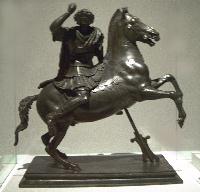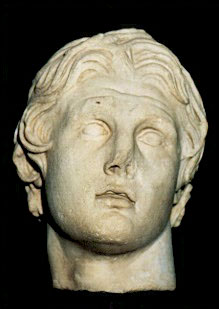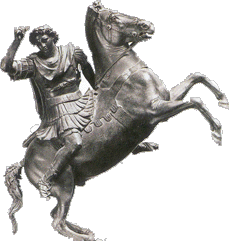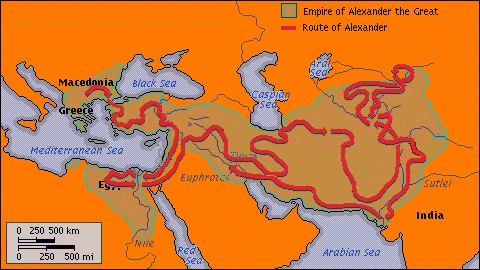Second Temple Judaism: A Brief
Historical Outline
Part One
Bruce N. Fisk
Bruce N. Fisk, Associate Professor of New Testament, Westmont College
(To
Part Two)
My thanks to Professor Bruce Fisk of
Westmont College
for his permission
to post this outline. Tim
1. From Israel's Exile to
the Death of Alexander the Great
1.1. Assyrian and Babylonian Rule [722-539 BCE]
722 Samaria, capital of Northern kingdom, falls to Assyria
(2K 17:5-6).
- Israel deported to Assyria (2K 17:6, 23).
- Non-Israelites are settled in Samaria (2K 17:24).
- Judah becomes a vassal state to Assyria (2K 18:13-16).
701 Sennacherib of Assyria surrounds Jerusalem during the reign
of Hezekiah but the city is spared through Isaiah's intercession
(2K 18:17-19:37).
621 Josiah's reforms begin in the 18th year of his reign (640-609).
- This "Deuteronomic" reform included smashing idols,
shrines, high places; killing priests; cleansing the temple (2K
23:1-25).
- Jeremiah began to prophesy in the 13th year of Josiah's
reign (626).
612 Nineveh, capital of Assyria, is destroyed by Babylon.
609 Battle of Megiddo: Josiah is killed.
- Judah, under Jehoahaz, becomes a vassal state to Egypt (2K
23:33).
605-562Nebuchadnezzar reigns in Babylonia.
605 Battle of Carchemish: Nebuchadnezzar defeats Pharaoh Necho
of Egypt.
- Judah, under Jehoiakim, becomes a vassal state to Babylon
(2K 24:1).
602 Jehoiakim rebels against Nebuchadnezzar (2K 24:1).
597 Babylon attacks and Jerusalem, under Jehoiachin, surrenders
(2K 24:10-14).
- Temple and palace treasures are removed (2K 24:13).
- First deportation: 10,000 leaders and artisans are deported
(2K 24:14) including Ezekiel (who prophesies from 593
to 573).
- Nebuchadnezzar installs Zedekiah (= Mattaniah; 597-588) as
puppet King (2K 24:17).
- Jeremiah advocates compliance with Babylon (Jer. 29:1-23;
32:5).
587/86 Zedekiah rebels (2K 24:20).
- Nebuchadnezzar invades Jerusalem and destroys the city, the
temple (2K 25:9) and the walls (2K 25:10; cf. Jer. 39; Deut.
28:49-57).
- Zedekiah is blinded and deported (2K 25:7).
- Final deportation to Babylon left only the poor in the land
(2K 25:11, 21; 2 Chron. 36:20; Jer. 52:27b).
- Gedaliah appointed as governor over those left behind (2K
25:22).
1.2. Persian Rule [539-334
BCE]
550-530 Cyrus II the Great reigns in Persia.
539/38 Cyrus conquers Babylon on Oct. 13.
- Cyrus' Edict of Toleration permitted many Jews
to resettle in Palestine (2 Chron. 36:22-23; Ezra 1:1ff.; 2:1ff.).
- First of several waves of Babylonian Jews returned.
- The temple foundation is laid under the leadership of Zerubbabel
and Jeshua (or Joshua), the high priest (Ezra 3:8, 10).
-
Go here for an image
of Cyrus' tomb.
529-522 Cambyses
522-486 Darius I
520-15 Haggai and Zechariah call for resumption
of temple construction (Ezra 5:1-2; 6:14; Hag. 1:8; Zech.8:9)
516 Darius I gives help to get the temple finished (Ezra 6:1-12).
- Second Temple dedicated (Ezra 6:14-15).
490 Darius defeated by the Greeks at Marathon.
485-465 Xerxes I
480 Xerxes is defeated by the Greek city states at Salamis.
464-424 Artaxerxes I
444 Nehemiah, in Persia, weeps over Jerusalem's condition.
- He is appointed governor of Judah by Artaxerxes I.
- Jerusalem's walls are rebuilt.
423-404 Darius II
404-359 Artaxerxes II
398? Ezra comes to Jerusalem, with the blessing of Artaxerxes
II and leads the people in reforming their worship.
359-338 Artaxerxes III
338-331 Darius III, the last king of Persia.
- During this period, the language of daily conversation among
Jews shifts from Hebrew to Aramaic, the language widely used
by the Assyrians and the lingua franca of the Persian
empire.
- Aramaic in scripture: Daniel 2:4b-7:28; Ezra 4:8-6:18; 7:12-26.
1.3. Hellenistic Rule [334-323 BCE]
359-336 Philip II
356 Birth of Alexander
338 Philip II of Macedon consolidates his power over the Greek
states.
336 Philip II assassinated. His son, Alexander, a student of
Aristotle, becomes king of the Macedonians at age 20.
334 Alexander the Great begins his eastward trek, beginning
in Asia Minor.
See Plutarch, Alexander, §23.
  
333 Battle of Issus (n.e. corner of Mediterranean Sea): Alexander
defeats Darius III and the Persians. [Plutarch, Alexander,
§20]
332 Alexander sweeps south through Palestine.
- Tyre resists (½ km offshore); it took A. 7 months
to build a causeway and conquer the city. [Plutarch, Alexander,
§24]
- Alexander offers sacrifices in Jerusalem. [Josephus, Ant.XI.325-339]
- He founded Alexandria in the western delta of the Nile.
331 Battle of Arbela: Alexander defeats the Persians at Guagemela,
south of Nineveh.
- Moves east through Babylon as far as the Indus valley (India)
until his troops refused to go further.
330 Darius III murdered by his own troops.
326 Alexander's conquests are complete.
323 Alexander dies in Babylon at age 32.

1.4. Hellenization and the Legacy
of Alexander
How did Alexander's conquests shape Western civilization?
How did Hellenization shape emerging Judaism, and the first generations
of Christians?
City-states
- numerous Greek cities were established including many "Alexandrias"
and "Alexandropolises"
- Greek city states were marked by autonomy and liberty
- about 30 Greek cities were established in Palestine and the
Transjordan alone
- Hellenization was most evident in urban centres (religious
worship, athletics, art, images, etc.) and among the wealthy,
and less evident in towns and countryside among the poor
Democracy
- all citizens have a vote in the ecclesia though many
(perhaps most) inhabitants were not citizens. A smaller elected
council (boule) handled daily affairs.
Language
- by 1st c. CE, Greek was spoken by a majority around the Mediterranean
- the need arose for Hebrew scriptures to be translated into
Greek: LXX
- NT was written in Greek
- Paul and others could travel widely and their message could
be understood
Syncretism
- as in other ancient cultures, religion and politics overlapped
- Hellenisation involved philosophical changes and cultural
shifts far more rapid and profound than those experienced during
Babylonian and Persian eras.
- religious syncretism/pluralism was valued highly
- Israel's religious traditions would face their most significant
challenges
Instability
- Alexander left NO successor. This meant that a consolidated,
unified, stable empire would be short lived. Power struggles
and conflict would ensue.
- Palestine was located precisely along one of the political
fault lines, and would be subjected to many years of instability.
- note that 1 Maccabees, the book chronicling the struggles
of the Jews for independence, begins with a summary of Alexander's
rule (1:1-4).
(To
Part Two)
|